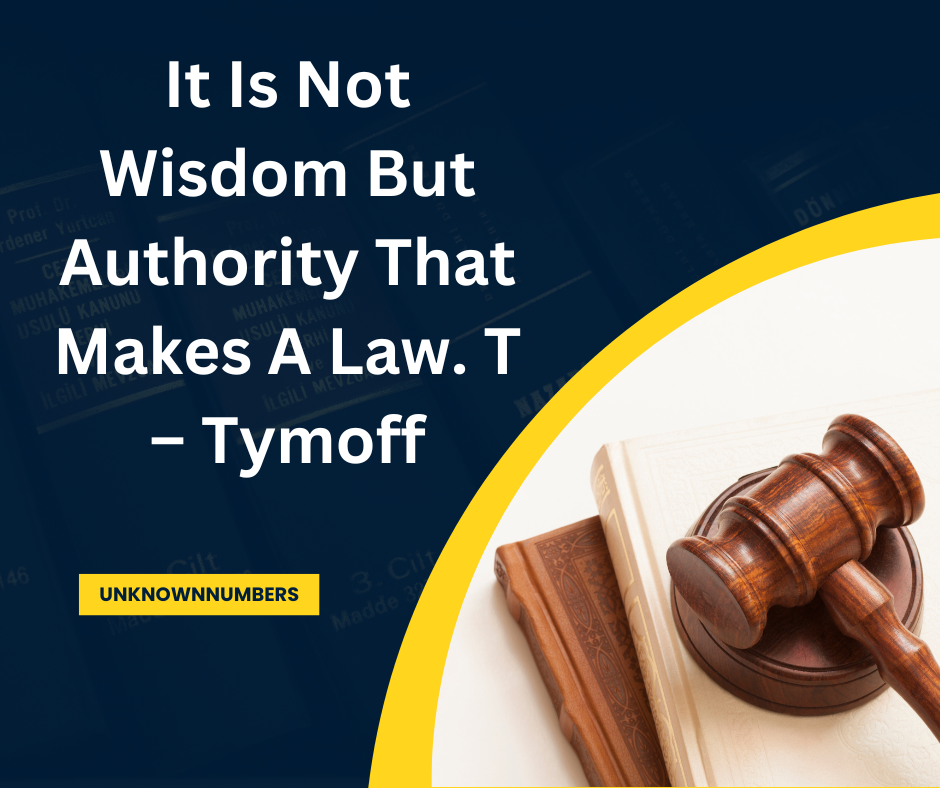Understand The Law: It Is Not Wisdom But Authority That Makes A Law. T – Tymoff
Introduction to the law and its purpose
Welcome to the intricate world of law, where the interplay between wisdom and authority shapes our society. Have you ever pondered on the origins of laws and who holds the power to dictate them? Join us as we delve into the age-old debate: not wisdom, but authority makes a law. T – Tymoff.
The role of wisdom and authority in creating laws
Laws are not merely random rules imposed on society but are crucial in maintaining order and justice. The creation of laws requires a delicate balance between wisdom and authority. Wisdom, derived from knowledge and experience, ensures that laws are just and fair. It allows for considering ethical principles and societal values when drafting legislation.
On the other hand, authority plays a pivotal role in enforcing these laws. There would be chaos and anarchy without authoritative institutions to uphold legal statutes. Authority gives power to laws – making them effective tools for regulating societal behavior.
In essence, wisdom provides the moral compass guiding lawmaking processes, while authority gives teeth to these regulations by ensuring compliance through enforcement mechanisms. Together, they form the foundation of a functional legal system that upholds justice and protects citizens’ rights.
It Is Not Wisdom But Authority That Makes A Law. T – Tymoff

The phrase It Is Not Wisdom But Authority That Makes A Law. T – Tymoff provokes thought on the dynamics behind legal systems. It suggests that laws are not solely crafted based on wisdom but enforced through authority. This notion challenges conventional beliefs about the origins of laws and their significance in society.
When analyzing this concept, one must consider the balance between knowledge and power in shaping legislation. While wisdom may inform the content of laws, authority ultimately dictates their implementation and enforcement. This dynamic highlights the intricate relationship between lawmakers, judicial bodies, and governing institutions.
The interplay between wisdom and authority is more complex in today’s modern society. With rapid technological advancements and evolving social norms, legal frameworks must adapt to meet contemporary needs while upholding fundamental principles of justice and fairness.
Critics argue that an overreliance on authority without considering ethical or moral implications can lead to unjust laws that oppress marginalized communities or infringe upon individual rights. Thus, there is a growing call for a more balanced approach to lawmaking incorporating wisdom and authoritative oversight.
By acknowledging the role of wisdom and authority in shaping laws, we can strive towards a legal system that reflects societal values while upholding principles of equity and justice for all individuals.
The impact of modern society on the creation and interpretation of laws
In today’s fast-paced world, the effect of contemporary society on the creation and interpretation of statutes is undeniable. With technological advancements and evolving social norms, lawmakers are constantly challenged to adapt legal frameworks to meet the changing needs of society.
The digital age has brought about new challenges, such as cybersecurity threats, online privacy concerns, and issues related to artificial intelligence. As a result, legislators must navigate these complex waters to ensure that laws effectively protect individuals’ rights while fostering innovation and growth.
Moreover, globalization has blurred traditional boundaries, requiring international cooperation in addressing transnational crimes like human trafficking and terrorism. This interconnectedness underscores the importance of harmonizing legal systems across borders for effective enforcement.
As we progress into the future, lawmakers need to remain vigilant in understanding how societal shifts influence the creation and interpretation of laws. Our legal system can better serve justice by staying attuned to these dynamics.
Criticisms of relying solely on authority in making laws
In modern society, criticisms arise when laws are created based exclusively on authority without considering wisdom. When laws are imposed without considering their impact on the people they govern, it can lead to injustice and societal unrest.
Relying solely on authority in making laws may result in a disconnect between the legal system and the values of the citizens it serves. Laws should reflect a society’s collective wisdom and moral compass, not just be dictated by those in power.
Furthermore, overemphasizing authority can lead to authoritarianism and oppression rather than fostering a fair and just legal system. Laws must be rooted in principles that uphold justice, equality, and fundamental human rights.
Critics argue that when authority dominates over wisdom in lawmaking processes, there is a risk of creating arbitrary rules that do not serve the best interests of all individuals within a society.
The importance of balance between wisdom and authority in creating just laws
Laws are the backbone of any society, shaping how we live and interact with one another. A delicate balance between wisdom and authority is essential in creating just laws. Wisdom brings insight, reflection, and moral clarity to the legal process. It helps in understanding the nuances of human behavior and societal needs.
On the other hand, authority provides legitimacy and enforcement power to ensure that laws are respected and followed. Without authority, even the wisest laws would be meaningless. When wisdom and authority work together harmoniously, they create a legal framework that promotes fairness, justice, and equality for all members of society.
Striking this balance is challenging but crucial for maintaining a just legal system. It requires lawmakers to consider what is right and how to implement those principles through legitimate power channels effectively. The interplay between wisdom and authority is dynamic and vital in shaping laws that serve the common good.
Conclusion: Striving for a balanced legal system through the combination of wisdom and authority
Balance is key in the intricate web of laws that govern our society. The fusion of wisdom and authority in crafting legal frameworks ensures fairness and justice for all. Wisdom brings insight, foresight, and a deep understanding of societal needs. It offers a moral compass to guide lawmakers toward equitable decisions.
On the other hand, authority provides the necessary power to enforce these laws effectively. It instills respect for the legal system and upholds order in our communities. Without authority, wise laws may remain mere words on paper without impact or relevance.
Striving for a balanced legal system means recognizing the importance of both wisdom and authority in shaping just laws. By harmonizing these elements, we can create a legal framework that promotes equality, protects rights, and fosters social harmony. Through this delicate equilibrium, we can achieve a fair and prosperous future for all individuals under the law’s umbrella.
FAQs
Q: How does authority play a role in the enforcement of laws?
A: Authority provides the necessary power to ensure compliance with laws by individuals and institutions.
Q: Can wisdom alone be sufficient in creating effective laws?
A: While wisdom is essential in crafting just laws, it must be backed by the authority to enforce them effectively.
Q: What happens when there is a lack of balance between wisdom and authority in legal systems?
A: A lack of balance can lead to unjust laws or chaos within society, highlighting the importance of harmonizing both aspects.
Also read: Geekzilla.Tech Honor Magic 5 Pro


One Comment
Comments are closed.